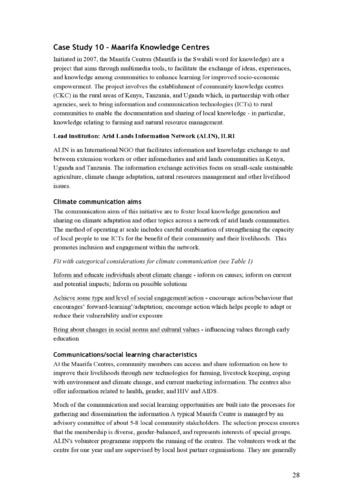Maarifa Knowledge Centres
Abstract
Initiated in 2007, the Maarifa Centres (Maarifa is the Swahili word for knowledge) are a project that aims through multimedia tools, to facilitate the exchange of ideas, experiences, and knowledge among communities to enhance learning for improved socio-economic empowerment. The project involves the establishment of community knowledge centres (CKC) in the rural areas of Kenya, Tanzania, and Uganda which, in partnership with other agencies, seek to bring information and communication technologies (ICTs) to rural communities to enable the documentation and sharing of local knowledge - in particular, knowledge relating to farming and natural resource management.
Lead institution: Arid Lands Information Network (ALIN), ILRI
ALIN is an International NGO that facilitates information and knowledge exchange to and between extension workers or other infomediaries and arid lands communities in Kenya, Uganda and Tanzania. The information exchange activities focus on small-scale sustainable agriculture, climate change adaptation, natural resources management and other livelihood issues.
Climate communication aims:
The communication aims of this initiative are to foster local knowledge generation and sharing on climate adaptation and other topics across a network of arid lands communities. The method of operating at scale includes careful combination of strengthening the capacity of local people to use ICTs for the benefit of their community and their livelihoods. This promotes inclusion and engagement within the network.
Communications/social learning characteristics:
At the Maarifa Centres, community members can access and share information on how to improve their livelihoods through new technologies for farming, livestock keeping, coping with environment and climate change, and current marketing information. The centres also offer information related to health, gender, and HIV and AIDS.
Much of the communication and social learning opportunities are built into the processes for gathering and dissemination the information A typical Maarifa Centre is managed by an advisory committee of about 5-8 local community stakeholders. The selection process ensures that the membership is diverse, gender-balanced, and represents interests of special groups. ALIN's volunteer programme supports the running of the centres. The volunteers work at the centre for one year and are supervised by local host partner organisations. They are generally young graduates in mass communication, agriculture, environmental studies, or community development. The volunteers manage the centre's activities, coordinating the collection of development-oriented local knowledge and experiences and training local communities on the use of ICT tools.
The information collected and submitted by community development workers, community members, or volunteers is shared through the OKN platform which links all the CKCs and is accessible across the ALIN network. To ensure continuity and effective knowledge transfer, the volunteers work with a local person who acts as a Community Knowledge Facilitator (CKF) representing local interests.
It is claimed that this information and knowledge flows across the ALIN network as well as being tailored for local dissemination to marginalised groups in a way that fosters inclusion, local interest and good understanding of local issues. This is an example of a looped/looped learning environment where practical local knowledge is shared, discussed and adapted for differing contexts.
Audience:
The centres offer basic ICT training to community members, often young people who have graduated from secondary schools as well as primary school pupils, many of whom have formed information clubs. The centres also act as information access points for community development workers who provide agricultural and related extension services in the region. They use the centres to acquire free (online) development information and to send weekly reports to their ministries or organisations, but also benefit from basic office services such as typing, photocopying, and free internet access.
The Maarifa Centres also support the active involvement of women. In order to enhance the capacity of women to play an active role in development initiatives and to reverse the trend of their insufficient inclusion, especially in the dry land areas, ALIN promotes the integration of women in development and information support.
Getting research into use (how this case study does or does not contribute to that):
This example demonstrates evidence of local practical examples of climate change adaptation being discovered, discussed and understood, and in some cases used elsewhere (local->local transfer). It is not so clear where the climate science meets traditional local knowledge and how this works together. Also, to what extent are traditional climate science centres learning from these more autonomous innovations (and the ALIN model itself) to change their approaches to monitoring, predicting, adapting to and communicating climate change.
Evolution of the project (how has the project evolved or developed if known):
The Maarifa centres started in 2007 and have expanded to 10 centres. Use of ICTs and people networks have evolved over this period to extend the outreach beyond the centres themselves to surrounding villages and communities.

